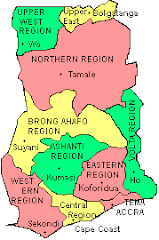AAB involves a series of meetings with farmer groups that focus on building strong groups and gaining basic business skills so farmers can make more income, therefore profit. We work with farmers that are small scale and mostly subsistence, and if you ask any of them if they want to make some money or more money I’m sure they will agree. The hard part I’m finding is the approach AEAs are taking. The AAB approach is to let the group do the analysis, make a plan, and make decisions while Mofa/EWB guides and supports them in this process. This process is done through facilitating discussions with groups with guideline questions and facilitation tips outlined on the AAB laminated cards given to AEAs.
The problem I’m finding is that AEAs are so used to a top down dissemination of knowledge/information and some aren’t letting the group decide, plan, and analyze at least without telling them the importance of record keeping or group meetings for instance (which are 2 topics covered on the cards). “Top-down” and “lecturing” sound like pretty harsh words so I need to clarify what I mean. Most of the AEAs, the ones I work with or not, are from villages and some even in this area, so they aren’t treating the farmers like unintelligent children, they are attempting to do what their regular job requirements: transfer knowledge which they’ve learned and are given by MoFA so farmers can adopt practices and techniques, like growing a new variety of maize that mature faster and can be harvested earlier. AEAs are doing their jobs the way they’ve been trained and also following their superiors instructions, they aren’t arrogant or condescending in how they talk with farmers.
Here’s where it gets complex: to a certain degree AEAs have the education and knowledge about some things that farmers don’t; many farmers we work with are illiterate for example. At the same time, it appears that to a certain degree farmers want to be educated on business skills and technical knowledge that will help them improve their livelihoods. So, if AEAs want to educate (through a form of lecturing, not harshly or anything, and even with jokes) and farmers want to be educated, then why are we trying to change this? This is one of the things I’m struggling with. Where’s the balance between pragmatic and appropriate, or participatory and teaching? Maybe those aren’t good words to describe the situation, but I think you get the point. Another factor could be farmers paying lip service to please the AEA who gives them fertilizer coupons that reduce the cost of a bag of fertilizer by about half.
From what I’ve observed in the field, through talking with long term volunteers, and reading reports and past experiences, the issue is that farmers voices aren’t being heard enough and their input, opinions, ideas, and concerns aren’t valued as much as they could or should be. As a result, our hypothesis is that: if farmers have more of a say, if they are able to honestly and openly share their ideas, if they are given some more power to do so, then we can learn from them and better understand how to support them in their activities so they can improve their livelihoods. I say hypothesis because we don’t want to make assumptions and present things as facts, for then we close ourselves off to feedback and potential changes. That said, we’ve found through our work with Mofa and farmer groups focusing on the 8 areas in AAB (group: strengths, meetings, finances, work/farm, business plan, record keeping, marketing, and evaluation) can make farmers more profits and improve their lives while feeling more in control over their futures and taking pride in the fact that they succeeded without a handout – usually in the form of a white man in a 4x4 giving money to the “helpless” (which is needed in some cases, but can lead to dependency and helplessness).
Hopefully I’ve been clear and haven’t confused anyone reading this. With all the uncertainty and complicated issues affecting our work, I’m staring to see some farmer groups that initially met with us and expected handouts like money or inputs (fertilizer, seed, chemicals, machinery) that are now starting to strengthen their group from within, make plans and set goals, and feeling like they can succeed. Groups express their appreciation for our support, knowledge and know-how to improve, and in a way we are doing this. At the same time, farmers are taking the initiative, driving the discussions, making the plans, thinking about what they want to do, how to do it, why it’s important or not, if its relevant and so on.
I think it’s also important to note that the groups are getting something tangible from AEAs in the form of fertilizer coupons which are subsidizing the cost of fertilizer (other groups and individuals are also receiving coupons, not just farmers involved with AAB). Groups are also discussing and planning with us through AAB, and receiving encouragement and information. Whether I like it or not, or accept it or not, I’m a white man in Africa working with an NGO - that means a clear wealth/power difference exists between farmers and myself. One of the implications or effects is that I’m treated with a certain amount of respect and prestige that a prominent older man would receive, therefore groups are somewhat encouraged to meet with us and participate in this program; they listen to what we have to say, and when I encourage groups or give my opinion my voice carries a little weight (definitely more than it should). I do struggle with this ‘white privilege’ and power disparity, but I try to be altruistic about it all and “use my powers for good” by encouraging and giving recognition, trying to understand and be open about what I’m doing and why I’m here, and leverage whatever weight my voice or actions carry to motivate farmers and AEAs.
I truly believe that this AAB program will help farmers earn more income, and one of the main reasons is because of the people involved. Most of the AEAs are good at what they do, they want to help farmers and do a good job, yet I can’t speak too much about this because of my limited time here and I don’t have the greatest understanding of all AEAs since I’m only working with and regularly communicating with 4. On the EWB front I can speak more confidently because I’m closer to them and communicate better with them: we have amazing people working here who are incredibly thoughtful, caring, hardworking, dedicated and motivated, and critically analyzing and reflecting to the extent that just about anyone you ask will explain how they’re not doing enough, things are happening too slow, or not enough progress has been made. They most likely will speak of their challenges and short coming more than their successes, but I like to quote Levi, our EWB director of overseas, on his description of EWB overseas volunteers: “insecure overachievers”. My coach the other day also said something along the lines of ‘we’re always undercutting our successes and whatever successes or progress we admit is usually an understatement.’ We are making progress and farmers are working their way out of poverty, but its hard to measure, it’s a slow process that takes time, it happens in different ways, and all the while we are always looking to improve and questioning our actions, assumptions, decisions, and ideas – hence, it’s complex and difficult for me to explain or understand clearly.
The approach we’re taking with AAB might sound flaky or not very concrete as we are always second guessing, and questioning our approach to see if it’s appropriate, relevant, and effective, but that’s the way it should be I think. People’s lives aren’t static they are dynamic and their surroundings are as well, therefore ‘development work’ must also be constantly changing and adapting to assist people in the changes they face. This changing atmosphere leads us to try new approaches and ideas leading to successes, insights and of course failures and shortcomings. We can learn just as much or more from our shortcomings and failures and use the learning to improve, the problem is that donors large and small always want to see results, which can lead to projects that show short term immediate gains that can fall apart soon after the project ends.
For instance, a project manager I interviewed at the local bank said the main problem here with NGOs is that they come for a short period of time, run their project, then leave, and when the project is over so are the benefits. He basically said there is no long term or sustainable projects happening in this district I’m in. However, it’s understandable why donors want to see direct and immediate results, if you donate 10, 100, or 1000 dollars I’m guessing you won’t want to hear about how the project didn’t produce the expected results, and how the NGO/charity learned valuable lessons that they will put into practice to ensure long term sustainable improvements on the ground are achieved, or the NGO/charity trying to explain the complexities involved on the ground and how concrete results may take 1-5 years, and the like. I think it’s much more comforting to read or hear about how your money went into the bricks of a school that was built, or the wages for labourers and materials that built a latrine or borehole, or polio vaccinations, etc. All important in their own respect, and I’ll be the first to admit that I enjoy reading a fuzzy letter with pictures and results from a charity I donate to, it makes me feel like I did something good – donate money – and people benefited – like a health center opened, or a family received livestock. But the point I’m wandering around here is that other types of projects that won’t produce immediate concrete results and focus on long term results are just as important, yet not as appealing to donors.
Here's a few photos of farmer groups involved with the Agric as a Business program:
The Abulu Zenga Wopolo Women’s Group proudly standing in front of their almost finished building they constructed on their own to hold meeting in









wow, fantastic post.
ReplyDeletethanks Brian.
Very cool to hear more about AAB and the challenges you are facing, and deciphering between EWB's approach and development at large, and what OVS are like, and everything!
Thanks for taking the time to do this. Was talking to Kyle at National Office and he said he reads your blog regularly.
Keep it up, full steam ahead til you're back on Canadian soil- soon!